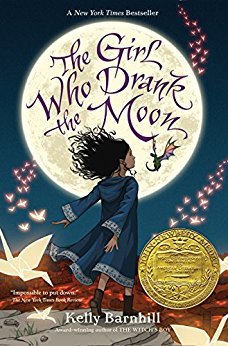I was having a conversation with Spring about Doctor Who, as we often do, and it occurred to me that The Doctor is actually an expatriate.
That’s really what this blog is about- I started to write here originally just to tell my family and close friends what I was up to during my time in Germany. Over time, however, my blog evolved into more than that- I talk about life as an expat, and I talk about things that are different from life back in the US, different from the life I knew before last year.
Every third or fourth time I use the word expatriate, or expat for short, someone asks me what it means. An expatriate is just somebody who lives outside of their native country, whether that be temporary or permanent. The original meaning of the word referred to people who were permanently exiled or who had renounced their homes, but the word is used much more generically now to describe anyone living outside their home country.
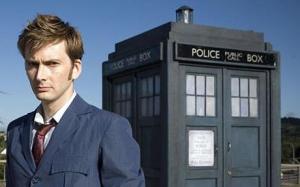 If you broaden the definition slightly of expatriate from country to planet, you can posit that the Doctor is actually an expat. His homeworld is Gallifrey, a planet that is lost forever in time, but he spends an awful lot of time on Earth, hanging out with humans and generally getting involved with the culture. That, my friends, is what an expatriate does. Most of us don’t spend quite as much time running as the Doctor, though, with the possible exception of Mandi.
If you broaden the definition slightly of expatriate from country to planet, you can posit that the Doctor is actually an expat. His homeworld is Gallifrey, a planet that is lost forever in time, but he spends an awful lot of time on Earth, hanging out with humans and generally getting involved with the culture. That, my friends, is what an expatriate does. Most of us don’t spend quite as much time running as the Doctor, though, with the possible exception of Mandi.
Talking about the Doctor as an expatriate got me thinking about all the other expats scattered throughout geeky pop culture, and there are hundreds upon hundreds of them. Since I’m a huge list-making nerd, this naturally led to me making a list of some of my favorite sci-fi and fantasy expats from movies, television, comics, and books. There are far too many to include in one sitting, but these are some of my favorites. I separate most of them into one of four basic categories: Last Of My Kind, Stranded, Out Of Time, and Expat By Choice.
The Doctor falls into the Last Of My Kind grouping.
 Another memorable example of the last of his kind is J’onn J’onnz, the Martian Manhunter. J’onn has taken on the human secret identity of John Jones, and he works as a police detective. Here we encounter a major genre caveat: Almost all comic book characters have had their story told and retold so many times that there are numerous versions, numerous origins, and numerous backstories. J’onn was not always the last of his kind, and certain versions of him have other martians around. In current continuity, there are green martians and white martians- J’onn is a green. In most of the versions though, J’onn spends much of his non-crimefighting time observing and trying to understand humanity.
Another memorable example of the last of his kind is J’onn J’onnz, the Martian Manhunter. J’onn has taken on the human secret identity of John Jones, and he works as a police detective. Here we encounter a major genre caveat: Almost all comic book characters have had their story told and retold so many times that there are numerous versions, numerous origins, and numerous backstories. J’onn was not always the last of his kind, and certain versions of him have other martians around. In current continuity, there are green martians and white martians- J’onn is a green. In most of the versions though, J’onn spends much of his non-crimefighting time observing and trying to understand humanity.
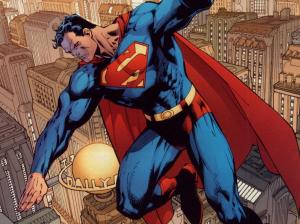 Continuing on in comics, we have perhaps one of the most famous expatriates of all time: Kal-El of Krypton. Sent to earth by his father to escape a dying planet, baby Kal is adopted by Jonathan and Martha Kent, and is raised as their son, Clark Kent. The story of Superman is so well known in our shared popular culture that even people who don’t read comics tend to have at least some knowledge of the story. One interesting question where Superman is concerned, however: In most versions of his story, Kal-El really knows very little of the cultural heritage of Krypton. He was raised on Earth, as an Earth child. Does this mean he’s not really an expatriate?
Continuing on in comics, we have perhaps one of the most famous expatriates of all time: Kal-El of Krypton. Sent to earth by his father to escape a dying planet, baby Kal is adopted by Jonathan and Martha Kent, and is raised as their son, Clark Kent. The story of Superman is so well known in our shared popular culture that even people who don’t read comics tend to have at least some knowledge of the story. One interesting question where Superman is concerned, however: In most versions of his story, Kal-El really knows very little of the cultural heritage of Krypton. He was raised on Earth, as an Earth child. Does this mean he’s not really an expatriate?
I could go on and on about expats in comics, since many of the comic book heroes are living outside their home countries. As my friend Frank Fradella put it when I bounced the idea for this post off of him, “…and geez… the entire “new” X-Men were expats. Storm, Colossus, Banshee, Sunfire, Nightcrawler.” Frank is right- if I keep listing comic book expats, we’ll never get around to other fun characters. Let’s move on to the Stranded expats.
While most expat stories in the sci-fi/fantasy genre tend to be fish out of water stories, it’s a pretty common trope to have people stuck somewhere, trying to get home. Heck, that’s the entire premise of Star Trek: Voyager. I don’t count them as expatriates, though, because they’re living in a community of their own kind (i.e. on board Voyager) and they’re not really integrating into the society around them as much as they’re just passing through. Star Trek: Voyager is the sci-fi equivalent of an American Army base in Germany- just passing through, folks.
 Often, however, the characters who fit this category are stuck. They want to go home, but don’t know a way. Like John Crichton in Farscape. John is an astronaut and test pilot. In the first episode of the series, he’s flying his module, Farscape One, and he is pulled into a suddenly appearing wormhole. When he exits the other side, he’s in the middle of a battle between the Peacekeepers, a human-looking species called the Sebacean, and a group of escaped prisoners of various alien species aboard Moya, a living ship. He’s pulled onboard Moya, and the rest of the series is a combination of his adventures with that group and his attempts to get home.
Often, however, the characters who fit this category are stuck. They want to go home, but don’t know a way. Like John Crichton in Farscape. John is an astronaut and test pilot. In the first episode of the series, he’s flying his module, Farscape One, and he is pulled into a suddenly appearing wormhole. When he exits the other side, he’s in the middle of a battle between the Peacekeepers, a human-looking species called the Sebacean, and a group of escaped prisoners of various alien species aboard Moya, a living ship. He’s pulled onboard Moya, and the rest of the series is a combination of his adventures with that group and his attempts to get home.
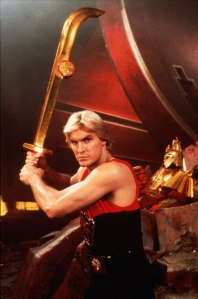 Flash Gordon‘s story is not all that different than John Crichton, although in the wonderfully campy 1980 movie version, he’s not an astronaut, he’s a professional football player. (The original 1930s version had him as a polo player.) During a series of pretty ludicrous events, he gets launched into space, and crash-lands on Mongo, before getting into a series of adventures with the various peoples of that world. Flash adapts amazingly well, and ultimately winds up saving the various different nations of Mongo from their evil overlord, Ming The Merciless. There have been other versions of Flash’s story, but the 1980 version is my favorite, partially because of the amazing Queen rock-score for the film, but mostly for the amazing cast, including Timothy Dalton as Prince Barin, Max von Sydow as Ming, and the amazing Brian Blessed as Prince Vultan:
Flash Gordon‘s story is not all that different than John Crichton, although in the wonderfully campy 1980 movie version, he’s not an astronaut, he’s a professional football player. (The original 1930s version had him as a polo player.) During a series of pretty ludicrous events, he gets launched into space, and crash-lands on Mongo, before getting into a series of adventures with the various peoples of that world. Flash adapts amazingly well, and ultimately winds up saving the various different nations of Mongo from their evil overlord, Ming The Merciless. There have been other versions of Flash’s story, but the 1980 version is my favorite, partially because of the amazing Queen rock-score for the film, but mostly for the amazing cast, including Timothy Dalton as Prince Barin, Max von Sydow as Ming, and the amazing Brian Blessed as Prince Vultan:

Moving on, then. The television series Land Of The Lost counts as a Stranded expat story, because the Marshall family (father Rick, children Will and Holly) accidentally moves through a dimensional portal and spends the rest of their time dodging dinosaurs and Sleestaks (humanoid reptilian bad guys) and trying to get back home. I have no particular fondness for this series, but I like saying “Sleestak.”
Another great expatriate character who is stuck away from his home is Oscar Zoroaster Phadrig Isaac Norman Henkel Emmannuel Ambroise Diggs, known to most as the Wizard of Oz. As with comics, there are many different versions of this character. In some versions, he’s fairly benificent. In the original book version, he really just wanted to go home. In the musical Wicked, (my favorite version, incidentally,) he’s actually kind of a dick.
 In another of my all time favorites, the TRON series, Kevin Flynn has a rather interesting version of being stuck in another place. Since 1989, Flynn has been living in the Grid, a fictional virtual reality world. We don’t really see much of Flynn’s life on the Grid, because the movie follows his son, Sam Flynn. Still, it’s evident from what you do see that he has established a remarkable life for himself there.
In another of my all time favorites, the TRON series, Kevin Flynn has a rather interesting version of being stuck in another place. Since 1989, Flynn has been living in the Grid, a fictional virtual reality world. We don’t really see much of Flynn’s life on the Grid, because the movie follows his son, Sam Flynn. Still, it’s evident from what you do see that he has established a remarkable life for himself there.
 Up until this point, all of my Stranded examples have been humans. However, one of my favorite expatriate characters isn’t human at all. He is, in fact, from a small planet somewhere in the vicinity of Betelgeuse. Ford Prefect, from the Hitchhiker’s Guide To The Galaxy series, has been in many formats- books, television shows, radio shows, a movie, comic books, trading cards- the version pictured to the right is the movie Ford, played by Mos Def. I prefer the book and radio show versions of Ford, but it was much easier to find a picture of the movie version. Ford is a roving researcher for the titular Hitchhiker’s Guide. He came to Earth to research it for the book, and got stuck for fifteen years.
Up until this point, all of my Stranded examples have been humans. However, one of my favorite expatriate characters isn’t human at all. He is, in fact, from a small planet somewhere in the vicinity of Betelgeuse. Ford Prefect, from the Hitchhiker’s Guide To The Galaxy series, has been in many formats- books, television shows, radio shows, a movie, comic books, trading cards- the version pictured to the right is the movie Ford, played by Mos Def. I prefer the book and radio show versions of Ford, but it was much easier to find a picture of the movie version. Ford is a roving researcher for the titular Hitchhiker’s Guide. He came to Earth to research it for the book, and got stuck for fifteen years.
We can go in with the Stranded examples for pages and pages, but I think it’s Time to move onto the Out Of Time category. (See what I did there?) These are characters who wind up stuck outside of their own time, like Booster Gold. I said I wouldn’t do any more comic book heroes in this list, though.
 I didn’t say anything about cartoons, though. Take Philip J. Fry, in Futurama for example. In the pilot episode of the series, Fry is a pizza delivery man who gets accidentally (ish) frozen in a cryogenic tube for one thousand years. He wakes up in the future, and starts working as a delivery boy (naturally) at Planet Express, a delivery company owned as a side-business by Fry’s distant, distant, very distant nephew, Professor Hubert J. Farnsworth. A quick side-note about Futurama- this show is insanely smart at times. From the earliest episodes, the creators plotted out certain things that get threaded throughout the series. For example, in the future world of Futurama, owls have become vermin and pests, not unlike city rats of the present day. Don’t believe me? Watch the show again from the beginning, and watch for owls.
I didn’t say anything about cartoons, though. Take Philip J. Fry, in Futurama for example. In the pilot episode of the series, Fry is a pizza delivery man who gets accidentally (ish) frozen in a cryogenic tube for one thousand years. He wakes up in the future, and starts working as a delivery boy (naturally) at Planet Express, a delivery company owned as a side-business by Fry’s distant, distant, very distant nephew, Professor Hubert J. Farnsworth. A quick side-note about Futurama- this show is insanely smart at times. From the earliest episodes, the creators plotted out certain things that get threaded throughout the series. For example, in the future world of Futurama, owls have become vermin and pests, not unlike city rats of the present day. Don’t believe me? Watch the show again from the beginning, and watch for owls.
 Getting back to our expats in time, we have Buck Rogers. Buck is another old character who has been in movies, television shows, comics, and even video games. The version most people know about is the 1979-1981 television show Buck Rogers, in which he’s a shuttle pilot who accidentally gets frozen for roughly 500 years. Once revived, he joins the Earth Defense Directorate, finds love, and gains a pet ambuquad named Twiki, a little robot who seems to have been designed to cash in on the popularity of C3PO and R2-D2 from the newly released film Star Wars.
Getting back to our expats in time, we have Buck Rogers. Buck is another old character who has been in movies, television shows, comics, and even video games. The version most people know about is the 1979-1981 television show Buck Rogers, in which he’s a shuttle pilot who accidentally gets frozen for roughly 500 years. Once revived, he joins the Earth Defense Directorate, finds love, and gains a pet ambuquad named Twiki, a little robot who seems to have been designed to cash in on the popularity of C3PO and R2-D2 from the newly released film Star Wars.
I can’t believe it never occurred to me before right now as I write this sentence that Buck Rogers + Flash Gordon = Farscape. Hmm.
 As with all my other examples of expats stuck out of time, John Spartan of Demolition Man was crygenically frozen. Whatever happened to a good old time machine? John Spartan is a cop, sent to CryoPrison in 1996. They wake him up about forty years later to stop another escaped cryoprisoner, the dastardly Simon Phoenix. You can tell that Simon is the bad guy because his hair is an unnatural yellow-white color.
As with all my other examples of expats stuck out of time, John Spartan of Demolition Man was crygenically frozen. Whatever happened to a good old time machine? John Spartan is a cop, sent to CryoPrison in 1996. They wake him up about forty years later to stop another escaped cryoprisoner, the dastardly Simon Phoenix. You can tell that Simon is the bad guy because his hair is an unnatural yellow-white color.
Let’s move on to the Expat By Choice category. I could reference Wonder Woman’s decision to leave Themyscira, but dang it, I said no more comic book heroes.
 In the Star Wars universe, Chewbacca could loosely be considered an expat. He isn’t hanging out on Kashyyyk with the other Wookiees. However, expanded universe canon states that he fled his home-world when the Empire enslaved the rest of the Wookiees to get construction of the Death Star back on schedule. This means that technically, Chewie is more of a refugee than an expatriate. Additionally, since he travels with his friend and business partner Han Solo to fulfill his life-debt (long story), Chewbacca isn’t really embracing the culture of any specific new place.
In the Star Wars universe, Chewbacca could loosely be considered an expat. He isn’t hanging out on Kashyyyk with the other Wookiees. However, expanded universe canon states that he fled his home-world when the Empire enslaved the rest of the Wookiees to get construction of the Death Star back on schedule. This means that technically, Chewie is more of a refugee than an expatriate. Additionally, since he travels with his friend and business partner Han Solo to fulfill his life-debt (long story), Chewbacca isn’t really embracing the culture of any specific new place.
While I would love to say that Babylon 5 is full of expatriate characters, it really only has two: Sinclair and Sheridan. Both of them go to live on Minbar at different points in the series. The rest don’t quite match the definition of expatriate because the different species on board Babylon 5 all have their own groupings. You rarely see a Pak’mara hanging out with the Gaim, for example, and you would never see a Drazi living on the Vorlon homeworld. It just isn’t done. Babylon 5 is a merchant outpost and a travel hub, and although it’s referred to as a city in space in the opening credits, it really isn’t. B5 is run primarily by EarthForce, and it has no predominant single culture.
 Similarly, Star Trek is full of characters who seem to fit the role of expat at first, but perhaps aren’t textbook examples. We have characters like Quark on Deep Space Nine, and Worf on board the Enterprise (and later, Deep Space Nine.) Quark is a merchant, and since the station is a trading post, he’s not really adopting the culture of a new home-world. As for Worf, he has Kal-El’s problem. Worf may have been born a Klingon, but he was adopted by and raised by humans. His primary culture is the one that he’s most commonly in touch with. Worf isn’t an expatriate at all. He falls into a slightly different category though, and I’ll touch on that a little bit later on. Lastly, from my Star Trek examples, there’s Spock. Spock was raised on Vulcan, but one of his parents was human. He chooses to live in Starfleet, which is mostly populated by humans. Even later in his timeline, when he becomes an Ambassador, he mostly sticks around Earth until his eventual trip to Romulus for reunification efforts between the Vulcans and Romulans.
Similarly, Star Trek is full of characters who seem to fit the role of expat at first, but perhaps aren’t textbook examples. We have characters like Quark on Deep Space Nine, and Worf on board the Enterprise (and later, Deep Space Nine.) Quark is a merchant, and since the station is a trading post, he’s not really adopting the culture of a new home-world. As for Worf, he has Kal-El’s problem. Worf may have been born a Klingon, but he was adopted by and raised by humans. His primary culture is the one that he’s most commonly in touch with. Worf isn’t an expatriate at all. He falls into a slightly different category though, and I’ll touch on that a little bit later on. Lastly, from my Star Trek examples, there’s Spock. Spock was raised on Vulcan, but one of his parents was human. He chooses to live in Starfleet, which is mostly populated by humans. Even later in his timeline, when he becomes an Ambassador, he mostly sticks around Earth until his eventual trip to Romulus for reunification efforts between the Vulcans and Romulans.
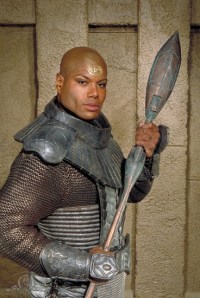 Now that we’ve covered Star Wars and Star Trek, I would be remiss to leave out the third Star* franchise, Stargate. Teal’c is another character that looks human, but isn’t quite human. He is a Jaffa, which is a genetically modified human with an abdominal pouch so that he can serve as an incubator for a larval Goa’uld symbiote. It’s not as icky as it sounds, because the symbiote grants its host Jaffa enhanced strength, health, and longevity as well as rapid healing. The Jaffa are also an enslaved race at the beginning of the series, serving as military forces to the System Lords, who are the initial run of bad guys in the show. I’m vastly oversimplifying the sequence of events here, but Teal’c defects to the SG1 team and goes back to Earth in the pilot episode of the series. He becomes a valuable member of the team, and he even tries to live outside of Stargate Command in a regular apartment at one point in the series. Naturally, he wears a hat to cover up the gold embossed tattoo on his forehead whenever he’s out in public.
Now that we’ve covered Star Wars and Star Trek, I would be remiss to leave out the third Star* franchise, Stargate. Teal’c is another character that looks human, but isn’t quite human. He is a Jaffa, which is a genetically modified human with an abdominal pouch so that he can serve as an incubator for a larval Goa’uld symbiote. It’s not as icky as it sounds, because the symbiote grants its host Jaffa enhanced strength, health, and longevity as well as rapid healing. The Jaffa are also an enslaved race at the beginning of the series, serving as military forces to the System Lords, who are the initial run of bad guys in the show. I’m vastly oversimplifying the sequence of events here, but Teal’c defects to the SG1 team and goes back to Earth in the pilot episode of the series. He becomes a valuable member of the team, and he even tries to live outside of Stargate Command in a regular apartment at one point in the series. Naturally, he wears a hat to cover up the gold embossed tattoo on his forehead whenever he’s out in public.
 Meanwhile, back in Sunnydale, we have a couple of Brits living in America. One of them is Giles, a Watcher, and the other is Spike, a vampire. (I won’t get into Liam… sorry, Angelus here, because his Irish accent was just too horrific for words.) The expats in Buffy The Vampire Slayer tend to be much more like the textbook definition of expatriate. Giles is sent to Sunnydale by the Watcher’s Council, and that’s not all that different than me being sent to Germany for my job. As for Spike, I suppose when you’ve lived for a hundred years or more, it makes sense to try to live somewhere different.
Meanwhile, back in Sunnydale, we have a couple of Brits living in America. One of them is Giles, a Watcher, and the other is Spike, a vampire. (I won’t get into Liam… sorry, Angelus here, because his Irish accent was just too horrific for words.) The expats in Buffy The Vampire Slayer tend to be much more like the textbook definition of expatriate. Giles is sent to Sunnydale by the Watcher’s Council, and that’s not all that different than me being sent to Germany for my job. As for Spike, I suppose when you’ve lived for a hundred years or more, it makes sense to try to live somewhere different.
 Also in the Expat By Choice category is Uncle Traveling Matt, a Fraggle who spends most of his time exploring “Outer Space,” his term for the normal human world the rest of us inhabit. Matthew is the quintessential exploring expatriate, constantly evaluating the culture and norms around him, even if his observations are more Jane Goodall than Terry Gilliam. (For those of you that know me well, you know I couldn’t do a list like this without including at least one Muppet.)
Also in the Expat By Choice category is Uncle Traveling Matt, a Fraggle who spends most of his time exploring “Outer Space,” his term for the normal human world the rest of us inhabit. Matthew is the quintessential exploring expatriate, constantly evaluating the culture and norms around him, even if his observations are more Jane Goodall than Terry Gilliam. (For those of you that know me well, you know I couldn’t do a list like this without including at least one Muppet.)
A few paragraphs back, I mentioned that Worf isn’t an expatriate, and that he falls into a different category than the rest of this list. That category is Third-Culture Kids. A third-culture kid, or trans-culture kid, in the real world is usually the child of an expatriate. For example, an American couple has a child while living in Germany. The child is American-born, but German by culture. When the family relocates back to the country of their passports, the child has to deal with this cultural divide. Third-Culture Kids are often multilingual, and are very often accomplished. However, adjusting to their passport country after years of living in other cultures can be incredibly difficult and can take a great deal of time. This is Worf in a nutshell, although he didn’t reintegrate with Klingon culture until very late in his life.
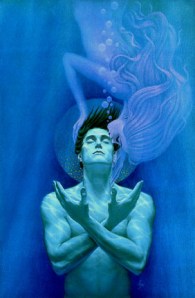 My favorite literary Third-Culture Kid would have to be Valentine Michael Smith, the man from Mars, in Heinlein’s amazing novel, Stranger In A Strange Land. Mike to his friends, Smith is the biological child of Mary Jane Lyle Smith and Captain Michael Brant of the Envoy, the first ship to travel to Mars. The fate of the Envoy crew is unknown for twenty years, and when another ship finally arrives to investigate, they find that Mike is the Envoy’s only survivor. Since Mike was raised by Martians, he went the first twenty years of his life never seeing any other human, and he spoke and thought in Martian at the beginning of the story. Michael Smith is an incredibly intelligent character, and it didn’t take him long to pick up most of the language, but the first two thirds of the novel deal with his adaptation to a completely alien culture- that of Earth- in a very detailed and fascinating way.
My favorite literary Third-Culture Kid would have to be Valentine Michael Smith, the man from Mars, in Heinlein’s amazing novel, Stranger In A Strange Land. Mike to his friends, Smith is the biological child of Mary Jane Lyle Smith and Captain Michael Brant of the Envoy, the first ship to travel to Mars. The fate of the Envoy crew is unknown for twenty years, and when another ship finally arrives to investigate, they find that Mike is the Envoy’s only survivor. Since Mike was raised by Martians, he went the first twenty years of his life never seeing any other human, and he spoke and thought in Martian at the beginning of the story. Michael Smith is an incredibly intelligent character, and it didn’t take him long to pick up most of the language, but the first two thirds of the novel deal with his adaptation to a completely alien culture- that of Earth- in a very detailed and fascinating way.
These are some of my favorite expatriates from Sci-Fi, Fantasy, and Comic Book culture. What are some of your favorites?
*Don’t know what Grokking means? I guess you should read Stranger In A Strange Land, then. I’m off to MegaCon in Orlando this weekend, so you can tell me what you thought of it after I get back.
49.016864
12.097408
